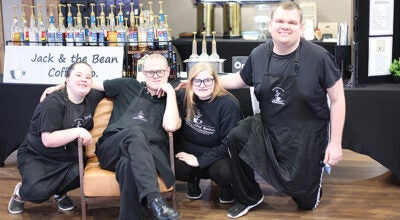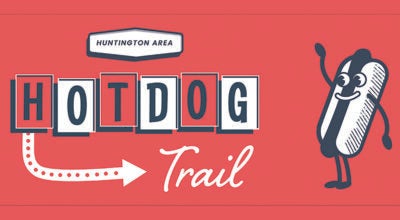Ex-bank boss goes from suits to work boots
Published 10:53 am Monday, September 26, 2011
HUNTINGTON, W.Va. (AP) — There’s a bit of Barnum, a bit of Billy Graham, and a bit of Bob Vila in him.
Huntingtonian A. Michael “Mike” Perry embraces all sides of his life and seems to be not only a jack of all trades, but a master of all as well.
He likes to tell the tale of the three girlfriends he had between the time he met Henriella Mylar in the fifth grade and when the two started dating seven years later. He sent them all love notes. It didn’t work out as he planned.
“I learned three things: one, girls talk; two, don’t put it in writing; three, monogamy is the only way to go.”
Married for 53 years, the Perrys have lived a life that’s a tribute to their working-class parents, to their strong faith and to a back-to-basics choice they made when their three children were young.
According to a booklet written by Perry, it’s a love story about a man who gave up golf because his wife “lovingly” asked him to find something they could do together as a family, and a woman who gave up living in a beautiful brick home in the city to move to a log cabin in the country.
Mike grew up in Huntington, attended Marshall University, majoring in political science and economics. The couple lived in Morgantown during his law school years at West Virginia University. He was practicing law with Huddleston Bolen law firm when Henriella suggested an alternative to his golf Saturdays – antiquing. They established as their budget the amount he was spending playing golf, about $5 a week in greens fees.
In the meantime, Mike’s father bought a 200-acre farm from the heirs of Col. Cornelius Blatt. After his father’s death at age 52, the farm became a refuge for Mike’s mother and family. The family made the farmhouse livable for weekend use.
When an adjoining farm became available in 1973, Mike and Henriella moved from their comfortable home in Huntington to a partially burned log house on the property with no indoor plumbing, one light and one electrical outlet for a radio. They had three children: Michele, 12, Melanie, 10, and Audy, 2.
Law partners and friends didn’t understand the move, wondering if the couple was having financial problems. But the Perrys knew it was the right thing to do for their young family.
A video shown at Perry’s Heritage Farm Museum and Village, titled “All Because Two People Fell In Love,” shows a photo of a suburban brick home. The voiceover says, “They moved from this house,” and the photo switches to a shamble of a farmhouse, “to this house.” The family worked on the house and barn for 15 years.
Every Saturday, their junking treks produced tools used to work with logs, and then other household items. The collection grew. In the 1980s, they started converting the old dairy barn on the property into storage space, but eventually realized they wanted their items to tell a story, and the barn became a museum for their collection.
Mike, 74, now retired from his position as chairman of Bank One West Virginia, serves on the board of directors of Champion Industries Inc., Portec Rail Products Inc. and Arch Coal.
Far from the boardroom, he now greets visitors to his village, which is open for tours. He’ll probably be munching on an apple, wearing muddy work boots, dirty work pants, a plaid Carhartt shirt and a ball cap emblazoned with “Heritage Farm Museum and Village.”
Henriella asked him to dress up a bit for visitors, but she knows this is his attire of choice.
“He wore suits for so many years – this is how he’s comfortable,” she said.
Mike said he’s been fortunate to live in multiple worlds. He was businessman by day, farmer/contractor/builder/collector by night and weekend.
“I’ve been involved in economic development,” he said. Later in the conversation he described trips to Japan to woo Toyota executives, meetings with senators and governors and even presidents.
Yet he was most passionate when he talked of a wonderful neighbor, now deceased, John Bickar.
“He took us under his wing and helped us learn as city folks how to live on the farm. We learned how to garden, butcher a hog, care for our cattle, raise corn as well as cut silage and put it up into the silo to feed our cattle in the winter, cut and bale hay, etc.
“Most important, he accepted us into a very close-knit community of early settlers and taught us many valuable lessons about being good neighbors and was a fabulous example of an Appalachian gentleman – creative, resourceful, energetic, as well as courteous. I admired him greatly. It truly takes everyone to make a great country. Not just the rich and famous, or just the average person, but the two working together to create a better place for all of us to live, work and play.”
He’s made many of his life dreams come true, including a simple one that took a lot of work to achieve.
“I always wanted to ring the church bell, so I built a church and I bought a bell,” he said, grinning.
“We staked out the church many times, to see how it would look from the road and from various points on the farm. The church is central to any community, and to this village.”
Church is central to the Perry family, too. They are faithful attendants at New Baptist Church, with a congregation formed from two churches in 2008 and services held in an abandoned ice skating rink. He’s taught Sunday school and they both sing in the choir.
“We’ve sung in the church choir together forever,” Henriella said.
Mike said the farm strengthens his faith. “If you’re a farmer, you can’t delude yourself that you’re doing it all by yourself – when you have a bountiful harvest, you have to thank the Lord.”
The Perrys have eight grandchildren. The farm is still a family endeavor, with Audy’s wife, Laura, running the office with Henriella. On a recent sunny day, Audy took a break from his law practice at his dad’s old firm, Huddleston Bolen, to come over and don work clothes to help around the property.
Reflecting on the experience of building their home, the farm, the museum, and the village, Mike smiles broadly.
“It’s been marvelous – we’ve had a ball.”



